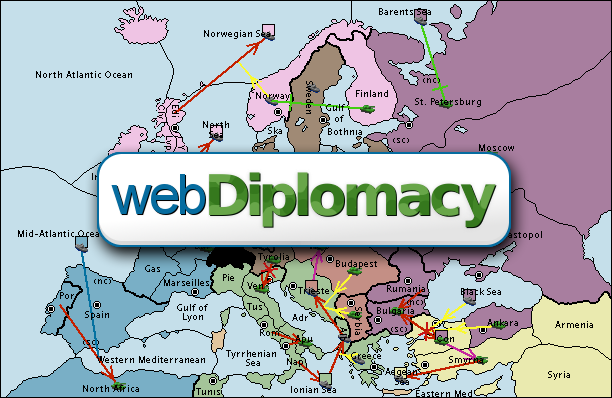Eventually, I was able to move into the modern world. I got a PC. Yep, a real computer. And I got t'internet.
Even more eventually I wondered: What will I find if I search for Diplomacy on the web? So I searched and the first return of note was Play Diplomacy Online.
So, I wasn't impressed with the map used back when I joined. But, you know what, it was only the map. The game system worked. The game was easy to access. It didn't have a long, long wait for things to happen. And I could play live games against people.
I think PlayDip was about a year old back then. Not everything ran smoothly. But it improved - massively. The map is now pretty looking, there are interesting variants available on the main site, the ranking system is much better than the old one, games are interesting and varied.
For me, though, it's always been the Forum that has interested me as much as playing Dip. The discussion about Diplomacy there is amazing.
I did spread my wings a bit. I joined webDiplomacy and tried that site. I have to say that, way back then, I was put off by two things.
At that point webDip's forum was awful. This was both in the way it was presented (which has changed today) but also in the posts there. At that time (maybe not so much now) the 'loud' people were often pretty ascerbic (understatement).
There was also a problem on one of the variant games, where there was a bug on the map. I reported it, like a good little player, and one of the Moderators came back with something along the lines of: This is a known bug. If you want to get rid of it, go and reprogramme it. Having come from a site where Mods actually did something about bugs to one where - then - they weren't interested was a bit of a shock.
If your site's Mods don't give a toss, I guess that's reflected by the site's membership, at least in part. I can't stress enough, though, that was then. It seems to be a better site now.
I've also been to other sites. I've at least visited every site on my menu under Dip Links - Play. The only other site I've really played for any time on is Stabbeurfou which is a French/English site. Didn't particularly like the messaging systems there, have to say.
Occasionally I get Dip-fatigue and have to stop myself playing for a while. There have also been times when ill health, or family issues, have got in the way and taken me away from this great hobby. But, generally, with the ease of accessing Diplomacy at my fingertips, I'm here to stay.
Even more eventually I wondered: What will I find if I search for Diplomacy on the web? So I searched and the first return of note was Play Diplomacy Online.
So, I wasn't impressed with the map used back when I joined. But, you know what, it was only the map. The game system worked. The game was easy to access. It didn't have a long, long wait for things to happen. And I could play live games against people.
I think PlayDip was about a year old back then. Not everything ran smoothly. But it improved - massively. The map is now pretty looking, there are interesting variants available on the main site, the ranking system is much better than the old one, games are interesting and varied.
For me, though, it's always been the Forum that has interested me as much as playing Dip. The discussion about Diplomacy there is amazing.
I did spread my wings a bit. I joined webDiplomacy and tried that site. I have to say that, way back then, I was put off by two things.
At that point webDip's forum was awful. This was both in the way it was presented (which has changed today) but also in the posts there. At that time (maybe not so much now) the 'loud' people were often pretty ascerbic (understatement).
There was also a problem on one of the variant games, where there was a bug on the map. I reported it, like a good little player, and one of the Moderators came back with something along the lines of: This is a known bug. If you want to get rid of it, go and reprogramme it. Having come from a site where Mods actually did something about bugs to one where - then - they weren't interested was a bit of a shock.
If your site's Mods don't give a toss, I guess that's reflected by the site's membership, at least in part. I can't stress enough, though, that was then. It seems to be a better site now.
I've also been to other sites. I've at least visited every site on my menu under Dip Links - Play. The only other site I've really played for any time on is Stabbeurfou which is a French/English site. Didn't particularly like the messaging systems there, have to say.
Occasionally I get Dip-fatigue and have to stop myself playing for a while. There have also been times when ill health, or family issues, have got in the way and taken me away from this great hobby. But, generally, with the ease of accessing Diplomacy at my fingertips, I'm here to stay.


Comments
Post a Comment
What do you think?